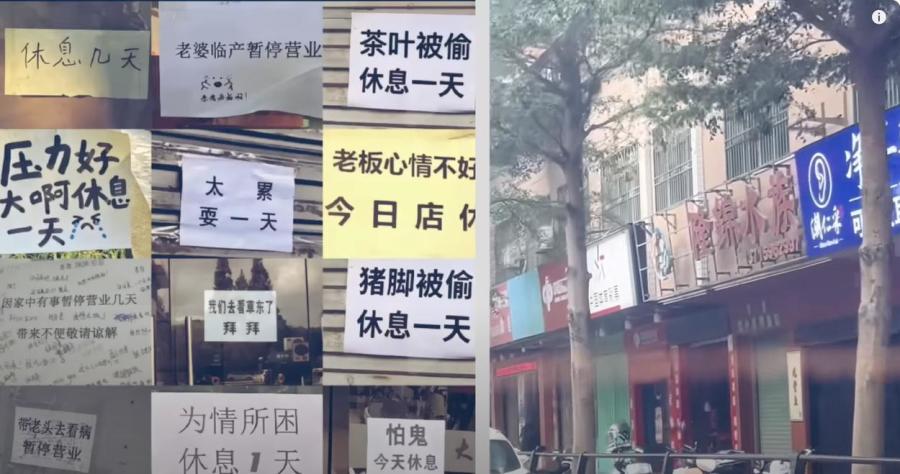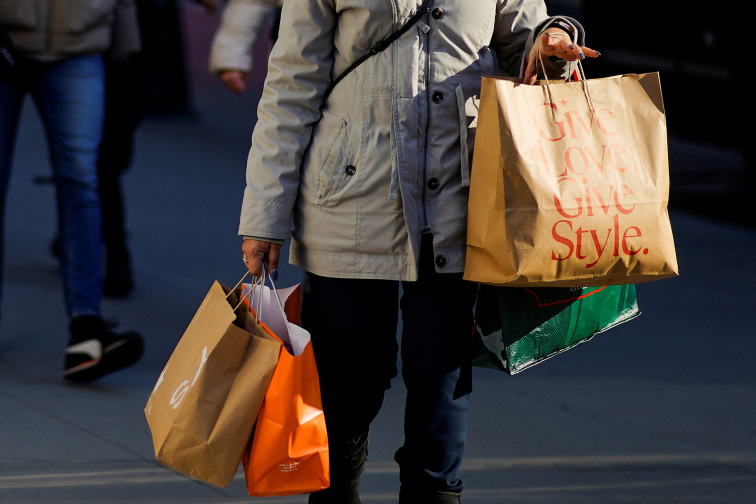Many businesses in Guangdong have posted a variety of humorous or creative excuses for their closures, such as "Afraid of ghosts," "Couple arguing," or "Boss in a bad mood" (screenshot from People News video).
[People News] Numerous factories and shops in Chaozhou and Shantou, Guangdong Province, have shut down their operations ahead of upcoming production and sanitation inspections. The closures are reportedly an effort to avoid steep fines from "overt and covert inspections." Even local night market stalls have been ordered to cease operations for a week. Local authorities, however, claim that these closures are isolated actions by individual businesses and not an attempt to evade inspections.
According to a report by Radio Free Asia, the State Council of China launched a special inspection of provincial government safety production and fire safety in early November 2024. In response to the State Council inspection team's safety production and fire safety checks, numerous videos circulating on social media this Sunday showed shops in Chaozhou and Shantou, Guangdong Province, pulling down their shutters, factories temporarily suspending operations, and previously bustling night markets falling silent. One barbecue stall owner posted a notice in a group chat stating that they would be taking a break. Many businesses put up various reasons to explain their temporary closures. A netizen shared a video on social media, saying: "To avoid fire safety inspections, shops and factories in Chaoshan have collectively closed for a few days. Some put up signs saying 'Afraid of ghosts,' others wrote 'Pig trotters and tea leaves were stolen,' and some claimed 'Bad mood, heartbroken.' Now the whole country knows about it."
Fearing fines of up to 50,000 RMB or even harsher penalties during fire inspections that might require costly adjustments, many businesses chose to close temporarily as a precaution. Once-busy commercial districts and night markets have quickly turned desolate. When contacted for comment, Chaozhou government officials denied the situation, stating: "That’s not true. There’s no such thing as mass closures. Those who shut down did so on their own. Shops are open."
Liu, a small business owner in Guangdong, spoke to Radio Free Asia on Monday, noting that officials typically conduct random inspections rather than large-scale checks: "This situation is making businesses too scared to open. It’s clearly unreasonable. In our area, inspections usually lead to street cleaning and temporary halts in construction work, but such large-scale closures of shops are rare."
Liu argued that while ensuring production safety is important, fines should not be the primary enforcement method.
Open-Flame Street Vendors Shut Down for a Week; McDonald's and KFC Suspend Operations Too
Due to inspections by local authorities, even international fast-food chains like McDonald's and KFC have opted to temporarily suspend operations. Some out-of-town visitors expressed surprise at the situation, with one describing the scene as "even quieter than during pandemic lockdowns."
It has been reported that night market vendors in Chaozhou and Shantou were ordered by local governments to cease operations for a week, with stalls using open flames being particularly affected. A notice from the Chaozhou municipal government stated that businesses and shops "must not deliberately close or refuse inspections without valid reasons," warning that stricter follow-up inspections would be enforced otherwise.
Some vendors revealed that the sudden decision caught them off guard, cutting off their immediate source of income without warning.
Fines and Pressure Trigger Wave of Closures
According to local notices, businesses found with safety hazards during inspections face fines ranging from 30,000 to 50,000 yuan, with more severe cases resulting in forced closures for rectification. Many shop owners admitted that the combined pressure of hefty fines and strict inspections has left them with no choice but to shut their doors to minimize risks. Some even noted that authorities required operators to memorize safety regulations.
Mr. Chen, a legal expert from Guangdong, told Radio Free Asia that this campaign might serve as a revenue generator for the government. "This is yet another way to collect money. It’s as if small shops and private businesses aren’t failing fast enough for their liking. I initially thought the State Council had sent people to Shantou to correct these inspection practices, but I was wrong. Their goal seems to be both maintaining stability by eliminating safety hazards and, objectively, helping local governments raise funds."
Mr. Chen further commented that almost all inspection-related actions in China nowadays are essentially aimed at imposing fines.
Businesses Under Mounting Pressure
One shopkeeper bluntly stated, "This isn't voluntary closure; we're being forced. No one wants to risk offending the inspection teams." This widespread anxiety has caused a rapid spread of closures, with some netizens lamenting, "Even during three years of the pandemic, it wasn’t this tough."
According to an announcement by the Ministry of Emergency Management, this round of assessments and inspections spans all 31 provinces, municipalities, and regions, with 22 assessment teams composed of members from the State Council's Work Safety Committee. Conducted from early to late November, the inspections target provincial governments and cover public venues such as exhibition halls, factories, dining establishments, and elder care institutions. The inspections combine mandatory and random checks. At a safety meeting in Guangdong Province on November 18, officials emphasized the importance of a comprehensive "major inspection and rectification campaign," focusing on exhibition zones, logistics parks, large commercial complexes, and similar venues.











News magazine bootstrap themes!
I like this themes, fast loading and look profesional
Thank you Carlos!
You're welcome!
Please support me with give positive rating!
Yes Sure!